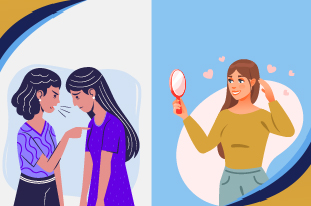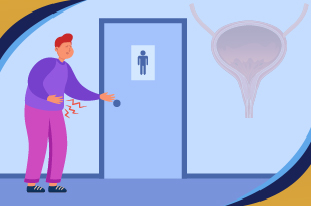ADHD, or attention-deficit/hyperactivity disorder has many different symptoms and traits. One of
these can be hypersexuality or hyposexuality (which is to have unsatisfactory sex lives). So, why is that the case and what is the connection that binds hypersexuality and ADHD together? Let’s find out in the world while also specifically discussing ADHD hypersexuality.
Defining ADHD
ADHD, or attention-deficit/hyperactivity disorder is a mental condition, predominantly diagnosed during childhood, that is characterized by symptoms such as procrastination, inattentiveness, inability to retain focus, restlessness, and others that attack the executive functioning of the affected individual directly. Executive functioning is your body’s functions and actions that help you sustain and service as a human. So, when executive functioning is affected then life can become extremely debilitating, and daily life is deeply affected, hurting your things such as relationships or work performance.
Read More: Everything about Emotional Dysregulation in ADHD
Defining Hypersexuality
Hypersexuality in a gist is an increased libido and excessive sexual interests that usually stem from certain neurological changes (such as the one stemming from sex addiction, substance abuse, or a whole different mental condition entirely) in your brain but can be present normally to, which makes it difficult to acknowledge its presence. It results in excessive or uncontrolled sexual thoughts, fantasies, and behaviors. It is more debilitating for men than women because of their higher propensity toward porn(1).
As people with hypersexuality are unable to regulate their sexual desires properly, it frequently leads to problems in relationships, and at times social isolation and sexual dysfunction.
Common signs of hypersexuality include:
- Spending excessive time on thoughts of sexual behavior
- Unable to control or reduce sexual urges in spite of the negative consequences
- Sex is used as a coping mechanism for things like stress, anxiety, or depression
- Engaging in risky sexual behaviors, like having unprotected sex or high-risk positions that can make STD transfusion possible
- Feeling guilt or shame about your sexual behaviors
- Having a hard time maintaining relationships due to infidelity or prioritizing sex over your day-to-day life
What’s the Connection Between ADHD and Hypersexuality?
Hypersexuality is essentially a common symptom of ADHD. That is not entirely correct because the main symptoms of ADHD, namely, impulsivity and hyperactivity likely result in increased libido (this probably answers a question like: Does ADHD affect sex drive?). This also motivates them to go out and seek out risky behavior and hypersexual fantasies as dopamine, the neurotransmitter capable of making you feel good, is deficient in people suffering from ADHD, which adds to their plight and probably motivates them to do something risky in terms of sexual activity. This was reportedly evidenced in a 2022 study done at the University of Cambridge in the United Kingdom(2). The experts reported significantly more often about a wide range of hypersexual fantasies and risky behaviors in comparison to those without ADHD.

Sex is essentially an enjoyable experience very much like video games and provides a welcomed distraction from distressing ADHD symptoms like excessive boredom, high anxiety, or stress. Additionally, people with hypersexuality and ADHD can dwell in escapism, which takes place when their sense of outside pressures and expectations aren’t being met, they will take matters into their own hands to meet their needs by engaging in self-stimulation. Escapism like it is a common factor in compulsive behaviors.
These are the common symptoms that might signal the affected individual is going toward ADHD hypersexuality:
- Impulsivity
- Hyperfixation
- Low dopamine levels(3)
- Executive dysfunction
- Emotional dysregulation
- Hyperactivity
Hope this answers questions like, “Is hypersexuality a symptom of ADHD”!
Read More: Understanding ADHD Mood Swings: A Journey Through Emotional Waves
How Hypersexuality Impacts ADHD and You?
Like ADHD is fond of disrupting an affected individual’s life, hypersexuality does that in a bigger way – affecting their romantic relationships, especially when the cause is infidelity, which is a common symptom of hypersexuality. People who are high on hypersexuality will focus on seeking gratification all the time and that will affect their focus so much that it would be difficult for them to give attention to work or school. This way performance will essentially suffer tremendously.
Furthermore, for people with ADHD, frequent masturbation or watching pornography as a form of self-soothing is the norm, which takes up time and can become an unhealthy habit. In addition to that, this gratification-seeking behavior will eventually lead the affected individual to a place of low self-esteem as broken relationships, poor performance at work or school, and simply the inability to focus on something can make you feel low about yourself.
All of these actions intensify feelings of shame, guilt, or self-loathing, making the existing feelings of self-esteem issues even worse, which also leads to isolation, and any impulsive spending on sexual activities, for example getting an escort service, may also lead to financial strain. In addition to the financial strain, you will also be in danger as having a lot of partners and engaging in a variety of sexual activities will lead you to catch a sexually transmitted infection (STI) or sexually transmitted disease (STD).
Hyposexuality and ADHD
Hypersexuality is not the only thing that is persistent as an indirect symptom of ADHD, as there is only one other thing that has a similar spelling but is exactly the opposite of it – hyposexuality. It is essentially also the answer to a question like – Does ADHD affect sex drive? – well it does and it does so by lowering the sex drive to negligible levels, which is when they often lose all interest in sexual activity. But this usually happens when there is a comorbidity of conditions like depression with hyposexuality and ADHD. It can also be the result of using antidepressants that are prescribed for treating ADHD.
Managing Hypersexuality and ADHD
There are some ways you can make some changes to your lifestyle so you can properly ADHD and hypersexuality:
Finding an alternate activity that is also highly stimulating
When you are feeling hypersexual, remind yourself that your brain needs dopamine. Instead of opting for sex, try to find an alternative activity that indeed gives you the dopamine boost but without the risks. For example, try playing a stimulating board game or going on the treadmill.
Inform Your Partner
If you are open to communication and are not afraid of telling them the truth, it will allow them to be more supportive of you as the picture will be clear for them.
Practice Mindfulness
With the help of mindfulness, you can become more aware of your thoughts and urges. Mindfulness is also helpful in reducing stress and therefore decreases the likelihood of using hypersexuality as a form of escapism.
Treating Hypersexuality and ADHD
In addition to these lifestyle changes, treatment like medication and psychotherapy but before embarking on these treatment methods, it is always a good idea to take an ADHD hypersexuality test, which combines the testing of ADHD and hypersexuality in one space. That would mark if you indeed need therapy or medication or rings true that hypersexuality is really there. After that, you can essentially move to the next step. Therapy and medication are also very good at treating both hypersexuality and ADHD, so it is always a good idea to go with them. Let’s see why but don’t forget that asking for help is not something to be ashamed of, and is the key step to breaking an ADHD hypersexuality addiction, so never ignore it as a treatment option.
Therapy
Effective treatment options for managing ADHD and hypersexuality via therapy include:
Cognitive Behavioral Therapy (CBT)
It’s a structured, goal-oriented type of talk therapy (psychotherapy) that helps you become aware of inaccurate or negative thinking. You can essentially view these challenging situations more clearly and respond to them in a more effective way. It is helpful in treating both hypersexuality and ADHD that way.
Sexual Therapy
If you are already getting your ADHD treated but its biggest proxy symptom, hypersexuality is not budging as it can make a habit of, you can use sex therapy to get rid of it. A sex therapist can educate about hypersexual and will also provide strategies for improving sexual function and pleasure while getting rid of hypersexuality.
Couples Therapy
If it is the case that the problem with ADHD and hypersexuality is leading you and your toward relationship problems or infidelity, then why not try this type of therapy? It can help your partner understand issues associated with hypersexuality and ADHD.
Medication
ADHD medications such as stimulants and antidepressants such as Selective Serotonin Reuptake Inhibitors (SSRIs) can help a person combat their ADHD-induced impulsivity and hyperactivity. If ADHD is treated then hypersexuality is automatically treated. But please note that these medicines, even though prescribed, can also lead to sexual dysfunction and hyposexuality. For that refer to your mental health expert to get clear and concise recommendations on medication. You can always complement medication with the therapies described above.
Read More: ADHD vs Bipolar Disorder: Comparing The Two Conditions
Wrapping up
As you have read it just previously, clear communication and prioritizing real sex in a more intimate way are just some ways people with ADHD can manage these challenges. If these do not work, then you can always refer to Orange Coast Psychiatry to treat hypersexuality and ADHD or other mental conditions such as Mood Disorder, Panic Disorder, MDD, trauma, Bipolar disorder, or Acute stress.
























